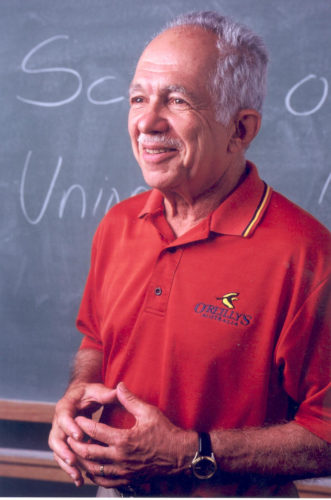
photo by Wyatt McSpadden
Prof. Julius G. Getman, the Earl E. Sheffield Regents Chair Emeritus, is back on bookshelves this winter with a new title published by Cornell University Press: The Supreme Court on Unions: Why Labor Law is Failing American Workers. In his book, Prof. Getman argues that the Supreme Court has become more and more central to shaping labor law in America, and yet its opinions “betray a profound ignorance of labor relations along with a persisting bias against unions.” With the fortunes of America’s working class so much in the public discussion surrounding this year’s presidential election and political rhetoric, Getman’s book could not be timelier.
We posed three quick questions to Prof. Getman about his new book, and what the subject means to him personally.
You write that judges and judicial opinions have a persistent bias against unions. How so? And why?
There are a variety of reasons for judicial bias. Judges tend to be elitist and unions are egalitarian, and very few judges share the experience of workers. Furthermore, some judges see collective bargaining as a distortion of the market. You know, unions disturb the status quo. The passion of strikes and strikers can be frightening, and picket lines are sometimes violent places.
Your book notes that unions are currently weak. Do you see them regaining strength?
No doubt that unions are weak right now. Membership is low and support limited. I have suggested in an earlier book (Restoring the Power of Unions: It Takes a Movement) that unions need to learn from the Civil Rights movement, and what the Civil Rights movement in turn learned from the labor movement of the 20s and 30s. This ranges from songs, to civil disobedience, to alliances, to limiting the power of leaders and increasing the role of members.
No one knows how unions will fare under the new administration, which is most unlikely to be union friendly. Trump has already attacked a local union leader in his tweets. But unions sometimes thrive under adversity!
This topic is obviously personal.
Absolutely. My father, who started working in a garment factory at age 10 was a staunch member of the ILGWU (The International Ladies’ Garment Workers’ Union.) It was the union that taught him to read! And I have worked with and taught steel workers, state police, clerical workers, hotel workers, paper workers and postal workers. I have always enjoyed it. What I learned working with unions is that they are far from perfect but that they can and usually do improve the lives of their members.
To learn more about Prof. Getman’s passion about unions and the practical and legal challenges they face, be sure to also check out his 2007 novel, Strike!, from Plainview Press, and read this interview he granted to the Portland Press Herald upon the novel’s release.
